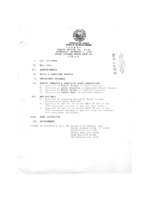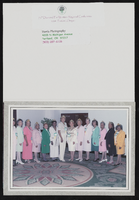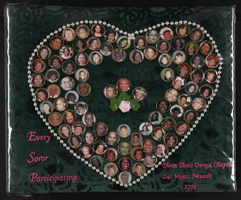Search the Special Collections and Archives Portal
Search Results

Junior Fonotisatele oral history interview: transcript
Date
Archival Collection
Description
Oral history interview with Junior Fonotisatele conducted by Cecilia Winchell and Stefani Evans on November 10, 2021 for Reflections: The Las Vegas Asian American and Pacific Islander Oral History Project. Junior discusses his Samoan background and the importance of strong family values. He talks about his early years in Utah and California before moving to Las Vegas where he attended and graduated from the University of Nevada, Las Vegas. Junior shares his employment history as a bodyguard for Floyd Mayweather, an entrepreneur of a clothing brand, and an investor into a range of ventures including security, solar energy, and mental health. He concludes with a discussion of Samoan cultural celebrations, his religion, and the significance of his tattoos.
Text
Steve Sisolak (Nevada Governor) oral history interview conducted by Magdalena Martinez: transcript
Date
Archival Collection
Description
From the Lincy Institute "Perspectives from the COVID-19 Pandemic" Oral History Project (MS-01178) -- Elected official interviews file.
Text

Meeting minutes for Consolidated Student Senate University of Nevada, Las Vegas, November 4, 1992
Date
Archival Collection
Description
Text

Nympha Comacchio oral history interview: transcript
Date
Archival Collection
Description
Oral history with Nympha Comacchio conducted by Cecilia Winchell and Stefani Evans on May 09, 2022 for the Reflections: the Las Vegas Asian American and Pacific Islander Oral History Project. In this interview, Comacchio recalls her childhood in the Philippines and growing up in a large family. After attending elementary school, Comacchio immediately went to work on her father's lumber farm, performing manual labor until she was seventeen. Later, she recalls finding employment as a seamstress in Manila, where she met her first husband when she left to work in Saudi Arabia for better pay. Comacchio describes how she was able to receive a student visa to finally immigrate to the United States, where she first arrived in California. Eventually, after meeting her second husband and hearing about housing prices in Las Vegas, Nevada, they purchased a house in the city in 2000. After briefly working for the New Frontier, Comacchio began working for the Wynn and Encore, where she found out about the Culinary Workers Union and became more active in that organization. Throughout the rest of the interview, Comacchio touches on the responsibilities of being a housekeeper, the current challenges they face, and how she feels about the growing AAPI population in southern Nevada.
Text
Michael Brown (Governor's Office of Economic Development) conducted by Kelliann Beavers: transcript
Date
Archival Collection
Description
From the Lincy Institute "Perspectives from the COVID-19 Pandemic" Oral History Project (MS-01178) -- Government agency interviews file.
Text

Alpha Kappa Alpha Sorority 75th Far Western Region conference materials
Date
Archival Collection
Description
From the Alpha Kappa Alpha Sorority, Incorporated, Theta Theta Omega Chapter Records (MS-01014) -- Chapter records file.
Text

Greg Phelps oral history interview: transcript
Date
Archival Collection
Description
Oral history interview with Greg Phelps conducted by Claytee D. White on November 15, 2017 for the Remembering 1 October Oral History Project. Greg Phelps discusses moving to Las Vegas, Nevada in 2002 for work and attending the 2017 Route 91 Harvest festival with his mother and wife. He describes the event venue as well as his recollection of the shooting. Phelps explains how his life changed after that day, describing the true friendships he gained and his greater appreciation for living.
Text

Alpha Kappa Alpha Sorority, Theta Theta Omega Chapter scrapbook: "Every soror participating"
Date
Archival Collection
Description
From the Alpha Kappa Alpha Sorority, Incorporated, Theta Theta Omega Chapter Records (MS-01014).
Mixed Content

Horacio Lopez oral history interview: transcript
Date
Archival Collection
Description
Oral history interview with Horacio Lopez conducted by Laurents Bañuelos-Benitez on September 05, 2018 for the Latinx Voices of Southern Nevada Oral History Project. In this interview, Lopez discusses his early life in Cordova, New Mexico and arriving to Las Vegas, Nevada in 1963. He recalls the establishment of the Nevada Association of Latin Americans (NALA), the increase of Latin Americans in the southwest region of the United States, and his role as the Vice President of the Latin Chamber of Commerce. Lastly, Lopez discusses his thoughts on the future of Latino culture.
Text
Olivia Diaz (City of Las Vegas Councilwoman) oral history interview conducted by Magdalena Martinez: transcript
Date
Archival Collection
Description
From the Lincy Institute "Perspectives from the COVID-19 Pandemic" Oral History Project (MS-01178) -- Elected official interviews file.
Text
